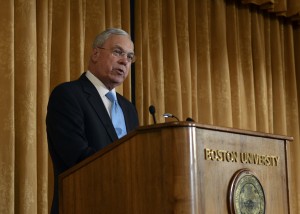
The Initiative on Cities at Boston University released its first report Tuesday since the creation of the program, which found Boston to be one of the most influential cities in the United States.
BU political science professors Katherine Levine Einstein and David Glick wrote the report titled, “Mayoral Policy Making: Results from the 21st-Century Mayors Leadership Survey.” The IoC is the urban leadership and research center at Boston University co-chaired by former Boston Mayor Thomas Menino and Political Science Department Co-Chair Graham Wilson.
Mayors from across the country were asked a number of questions regarding policy development, challenges they face and priorities when making decisions in their respective cities. The survey determined Boston and New York to be the two most influential cities in the country.
“[The purpose of the study was] to provide and collect information that would hopefully be helpful to mayors, to help inform the activities of the Initiative on Cities and give them a better sense of what mayors are working on,” Glick said.
Mayors participating in the study were interviewed over the course of Summer 2014, beginning at the United States Conference of Mayors in Dallas from June 20 to 23. The mayors were surveyed in one-on-one interviews, over the phone and through an online survey where they could complete a questionnaire thoughtfully.
Glick stressed the importance of political science research and its potential to affect mayors’ perspectives on running their cities. He said small cities and large cities share similar priorities, such as concern about climate change and preference for redistributive initiatives. He also cited some major differences the study found, including that smaller cities tend to spend more money on improving the quality of life, while larger cities invest more in infrastructure or education.
“We found differences between big cities and small cities, of course there are, but I was really surprised to find such similarities between the two,” Glick said.
Menino said the results of the study say a lot about the nature of the city of Boston and the people who live there.
“The population of Boston rises every 10 year census, crime numbers are down and schools are improving,” he said. “We are a livable city, workable city, a city with a heart.”
Menino said future reports will focus on other concerns that were not examined in the first report.
“In future reports, we’re trying to prioritize all your life concerns such as public safety, fiscal infrastructure, which means the physical and fiscal and social infrastructure, as well,” he said.
Glick said the results of the study are a testament to the effective leadership of the mayors of both New York and Boston.
“What the data shows is that the mayors in our sample, which is still a fairly small sample and not perfectly representative of all cities, tended to list New York and Boston more often than some other cities,” he said. “There is no one city that everyone is consistently looking to for ideas. I think there’s a perception that those two cities have done quite well over the past few years and have had good leadership.”
Ahmet Tekelioglu, a graduate student in the College of Arts and Science who is enrolled in a class taught by Glick and Einstein, “The Politics and Policy of HBO’s The Wire,” said the results of the study provide audiences with valuable insights into urban policy.
“Just as they emphasize while teaching PO 313 [The Wire class], Glick and Einstein’s recent report is a careful study on urban challenges and public policy,” he said in an email. “BU’s Initiative on Cities is a new and valuable resource both for students and academics. This report is one of the early signs that both the BU community and the academic, general and policy audiences alike will benefit from novel, careful insights on urban policy.”

